- About
- Our Members
- Scholars
-
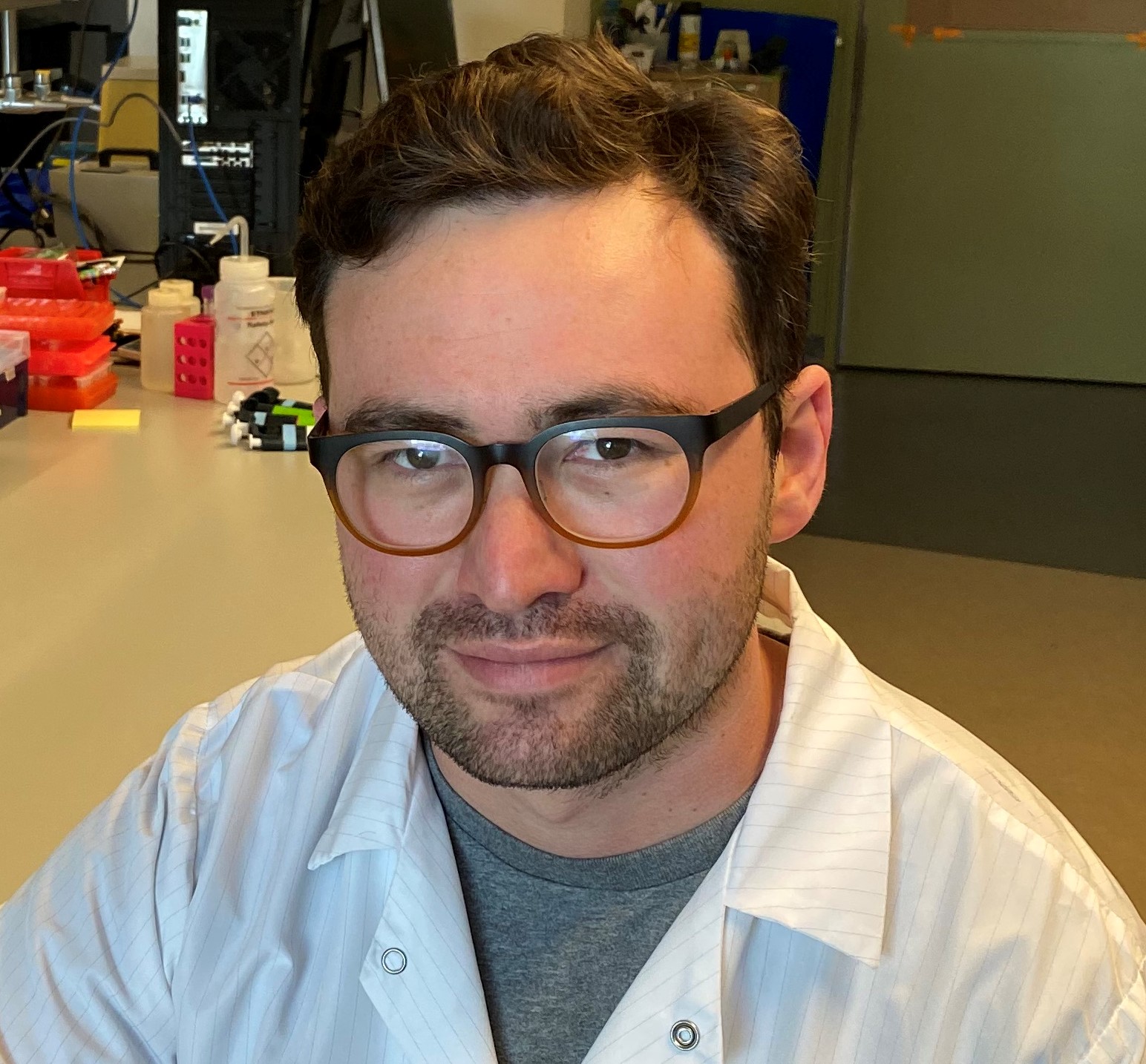 Jeremiah Tsyporin, University of California, Santa Cruz“As I enter the final year of my PhD, I am beginning to look for mentors to oversee my post-doctoral training. One of the significant ways I can find a mentor is through the networking opportunities offered at conferences. Without this generous support, these opportunities to share my work with the greater neuroscience community would have been impossible for me. In addition to attending conferences and connecting with neuroscientists worldwide, support from ARCS has helped ease the economic burdens associated with the cost of living in Santa Cruz. Because I don’t have to focus so heavily on dealing with basic needs, I have the freedom to spend more time and mental energy focused on research and intellectual pursuits central to a successful PhD.”
Jeremiah Tsyporin, University of California, Santa Cruz“As I enter the final year of my PhD, I am beginning to look for mentors to oversee my post-doctoral training. One of the significant ways I can find a mentor is through the networking opportunities offered at conferences. Without this generous support, these opportunities to share my work with the greater neuroscience community would have been impossible for me. In addition to attending conferences and connecting with neuroscientists worldwide, support from ARCS has helped ease the economic burdens associated with the cost of living in Santa Cruz. Because I don’t have to focus so heavily on dealing with basic needs, I have the freedom to spend more time and mental energy focused on research and intellectual pursuits central to a successful PhD.” -
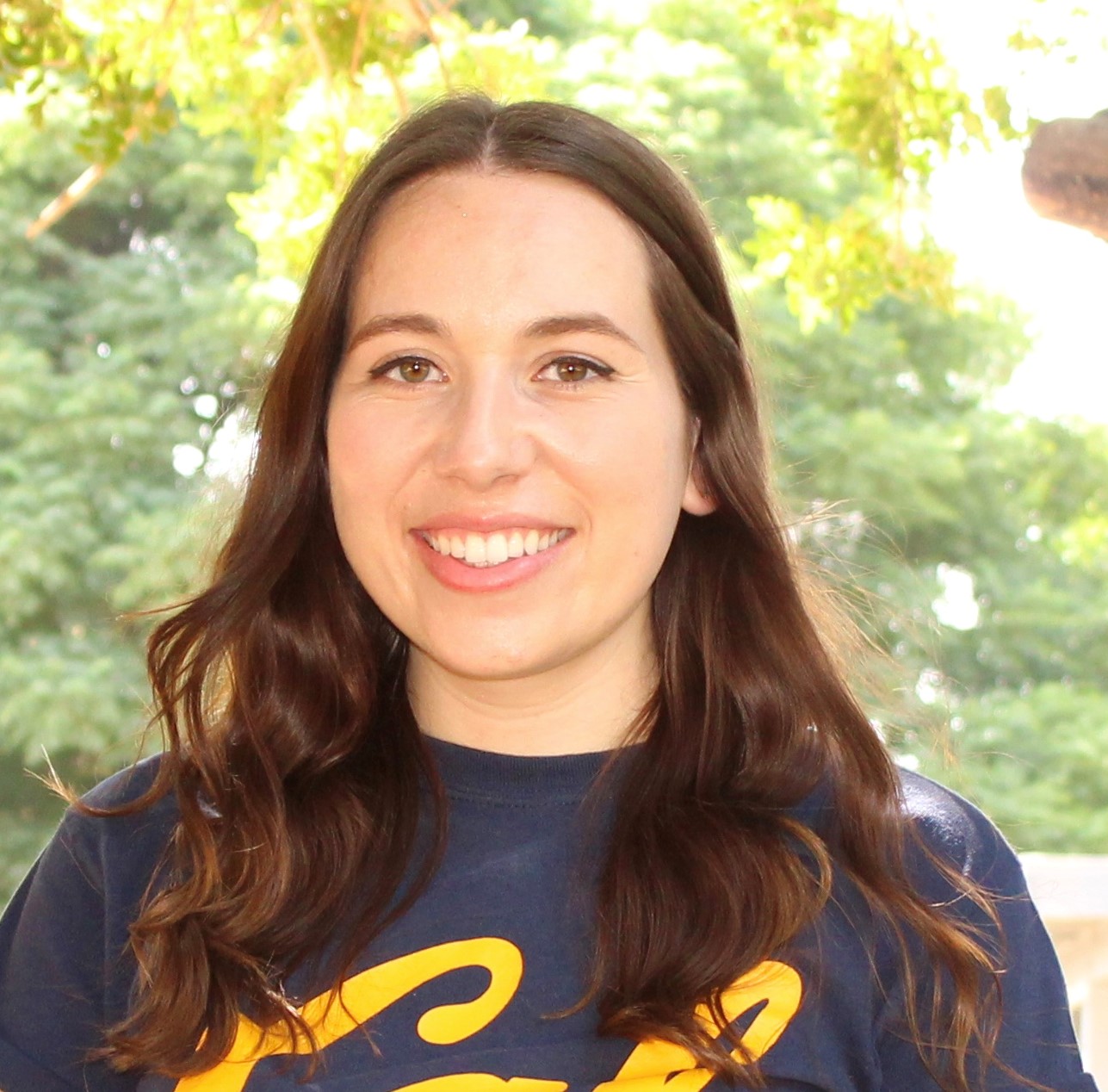 Rachelle Stark, University of California, Berkeley“I grew up in a low-income community in San Bernardino, California where I directly saw the harsh reality of how diet contributes to many diseases (diabetes, cardiovascular disease, obesity, etc.). These preventable diseases tragically took the lives of many people in my community. For these reasons, doing research related to nutrition/metabolism is extremely important and fulfilling to me. The [ARCS Award] gives me more options for labs because I will not have to rely on the funding of the lab I choose and can instead choose a lab purely based on my research interests. The funding will also give me more time to work on the research that I find so important and fulfilling.”
Rachelle Stark, University of California, Berkeley“I grew up in a low-income community in San Bernardino, California where I directly saw the harsh reality of how diet contributes to many diseases (diabetes, cardiovascular disease, obesity, etc.). These preventable diseases tragically took the lives of many people in my community. For these reasons, doing research related to nutrition/metabolism is extremely important and fulfilling to me. The [ARCS Award] gives me more options for labs because I will not have to rely on the funding of the lab I choose and can instead choose a lab purely based on my research interests. The funding will also give me more time to work on the research that I find so important and fulfilling.” -
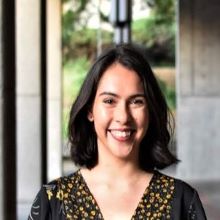 Katherine Montana, San Francisco State University“I will be pursuing my master’s degree in integrative biology at San Francisco State University and conducting my research at the California Academy of Sciences. I am thrilled to get started on my research and mentoring projects. … This combination of research activities will offer me the opportunity to build my technical lab skills, storytelling abilities, and capacity to help other students succeed in science. ... I am deeply honored to receive the [ARCS Award] and take great joy in starting graduate school. I thank you for making this possible for me. I am ready to get to work.”
Katherine Montana, San Francisco State University“I will be pursuing my master’s degree in integrative biology at San Francisco State University and conducting my research at the California Academy of Sciences. I am thrilled to get started on my research and mentoring projects. … This combination of research activities will offer me the opportunity to build my technical lab skills, storytelling abilities, and capacity to help other students succeed in science. ... I am deeply honored to receive the [ARCS Award] and take great joy in starting graduate school. I thank you for making this possible for me. I am ready to get to work.” -
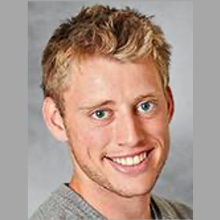 Micah Swann, University of California, Davis“I’m conducting applied limnological research on the pristine lakes of Northern Patagonia, in collaboration with Fundación Chile Lagos Limpios. This model will be used to investigate how the physics and water quality of these pristine lakes wi1l be impacted by climate change and watershed development over the course of the 21st century. In September 2019, I had my first opportunity to visit Northern Patagonia … but due to Covid-19 safety and travel restrictions, I have not had the opportunity to return to Chile. With your financial support, I will be able to return to the region in January 2022 and continue collecting data to improve the accuracy of the lake model under development.”
Micah Swann, University of California, Davis“I’m conducting applied limnological research on the pristine lakes of Northern Patagonia, in collaboration with Fundación Chile Lagos Limpios. This model will be used to investigate how the physics and water quality of these pristine lakes wi1l be impacted by climate change and watershed development over the course of the 21st century. In September 2019, I had my first opportunity to visit Northern Patagonia … but due to Covid-19 safety and travel restrictions, I have not had the opportunity to return to Chile. With your financial support, I will be able to return to the region in January 2022 and continue collecting data to improve the accuracy of the lake model under development.” -
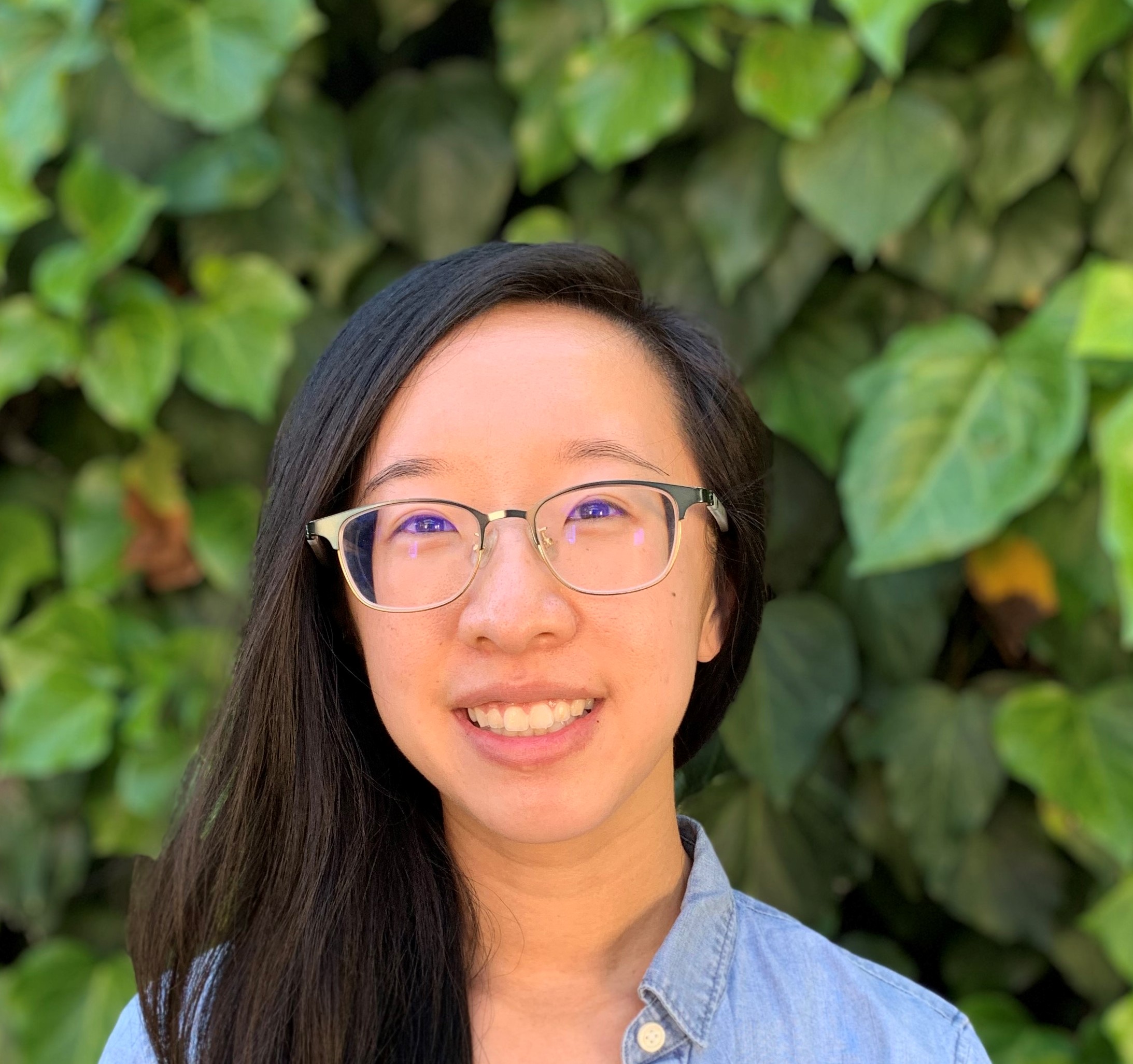 Julie Chang, Stanford University“The ARCS Award will allow me to focus on my PhD studies without worrying about finances. My research focuses on understanding the physics of breast cancer cell migration using 3D hydrogels and time-lapse imaging. The PhD journey itself has been a rollercoaster and I’m excited to finally see the light at the end of the tunnel! After my PhD, I am hoping to land a role as a clinical scientist in the biotech industry in the Bay Area. In this role, I can help analyze and interpret clinical trial data to develop drugs that can cure human diseases. Thank you again for the ARCS award—funding the next generation of scientific thinkers is truly an impactful mission!”
Julie Chang, Stanford University“The ARCS Award will allow me to focus on my PhD studies without worrying about finances. My research focuses on understanding the physics of breast cancer cell migration using 3D hydrogels and time-lapse imaging. The PhD journey itself has been a rollercoaster and I’m excited to finally see the light at the end of the tunnel! After my PhD, I am hoping to land a role as a clinical scientist in the biotech industry in the Bay Area. In this role, I can help analyze and interpret clinical trial data to develop drugs that can cure human diseases. Thank you again for the ARCS award—funding the next generation of scientific thinkers is truly an impactful mission!” -
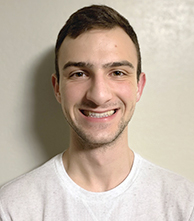 Nicholas Elder, University of California, San Francisco (UCSF)“I am grateful to earn my degree at UCSF which is world-renowned for its stem cell research. Likewise, it has been a pleasure to be supported by the ARCS Foundation and wider community. Research is a costly endeavor and being awarded this fellowship has given me the time and space to focus on impactful research while also sharing it with an interested group of donors and other scholars. The fellowship has also been a reassurance. This fall, my supervisor announced that he was leaving academia for an industry position. As I searched for a new supervisor and lab in which to complete my research, I knew that I had financial support to ease my transition.”
Nicholas Elder, University of California, San Francisco (UCSF)“I am grateful to earn my degree at UCSF which is world-renowned for its stem cell research. Likewise, it has been a pleasure to be supported by the ARCS Foundation and wider community. Research is a costly endeavor and being awarded this fellowship has given me the time and space to focus on impactful research while also sharing it with an interested group of donors and other scholars. The fellowship has also been a reassurance. This fall, my supervisor announced that he was leaving academia for an industry position. As I searched for a new supervisor and lab in which to complete my research, I knew that I had financial support to ease my transition.”
2023-2024 ARCS Northern California Scholars
ARCS Northern California Chapter is thrilled to recognize the work of our outstanding scholars for 2023-2024
To view an archive of our 2021-2022 scholars, click here.
To View an archive of our 2022-2023 Scholars, click here.
SAN FRANCISCO STATE UNIVERSITY
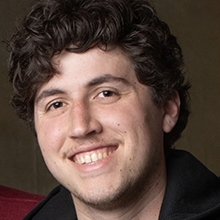 Amin Al-Jamal
Amin Al-JamalDepartment of Biology (Integrative)
Amin al-Jamal is an arachnologist with a passion for science education and a broad range of experience and interest in biology. He is particularly interested in invertebrate predators, like spiders and predatory insects, their evolution, and the pressures they exert on their ecosystems. He has a broad range of expertise including insect and arachnid identification and animal behavior. Amin’s research is focused on the morphology and evolution of spiders in the family Dictynidae, which are generally small and brown and have been given very little scientific attention historically. Despite the lack of attention, this is an enigmatic group with a wide range of fascinating ecologies and behaviors, and recent genetic studies of the group have laid the groundwork for further morphological investigation. Amin is also a talented artist and leverages his knowledge of biology for speculative anatomy and creature design.
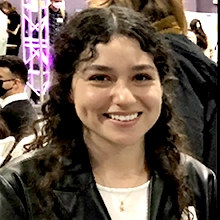 Berenice Baca-Ceballos
Berenice Baca-CeballosDepartment of Biology (Marine)
LAKESIDE FOUNDATION SCHOLARBerenice is fascinated by the diversity and beauty of developmental stages. As an undergraduate, she was the first to rear brooding sea star embryos in the genus Leptasterias through hatching and juvenile development, while discovering variation in timing of hatching, potentially related to maternal care. This tour de force earned her several awards and will be the basis for her Master’s research exploring the impact of environmental variables on reproductive patterns in marine organisms. Berenice gained specialized training through the University of Washington’s Larval Ecology course and the Comparative Embryology course at the University of São Paulo. As a first-generation college student, she aims to gain a PhD while pursuing her interests in developmental biology, ecology, and evolutionary biology.
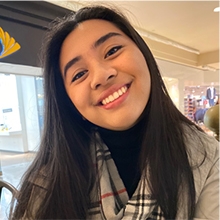 Mariah Angel Cuyson
Mariah Angel CuysonDepartment of Biology (Cellular & Molecular)
Mariah is a first-generation graduate student interested in researching the link between the ecology of emerging infectious diseases and public health. Her interest in studying vector-borne diseases sparked as an undergraduate research assistant in Dr. Andrea Swei’s lab at San Francisco State University. Continuing her research as a Master’s student in the Swei lab, Mariah’s project will focus on the impact of host blood meal identity on tick microbiomes by developing a multi-species analysis on small mammals and reptiles. Mariah also currently serves as the NSF/CSU Louis Stokes Alliance for Minority Participation (LSAMP) Program Administrator at SFSU, which aims to financially support undergraduates from underrepresented and disadvantaged backgrounds majoring in STEM. Outside of the lab, another passion of Mariah’s is music, and you can often find her playing the electric guitar and singing her heart out.
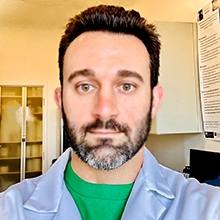 Anthony Donahue
Anthony DonahueDepartment of Biology (Marine & Estuarine)
Anthony gained extensive experience in aquaculture of aquatic organisms, including the endangered Delta Smelt and threatened Longfin Smelt, while working at the UC Davis Fish Conservation and Cultivation lab as a fish culturist, and has worked at UC Berkeley in a lab assisting with Zebrafish husbandry. His current plan is to pursue a PhD in Marine Biology or Biological Oceanography, and his thesis project includes studying the variability in the natural diets of the larval stages of native and non-native fishes across restoring wetlands of the San Francisco Estuary, using next-generation DNA sequencing. In a prior life, Anthony was a sommelier, and he has extensive knowledge of a wide variety of wines.
 Alyssa Estrada
Alyssa EstradaDepartment of Biology (Cellular & Molecular)
Alyssa has been conducting her research activities in the Amagata lab. Alyssa’s project is to isolate and characterize the organic compounds from marine sediment-derived Actinomycete bacteria strain Streptomyces sp. CP55-76, which was chosen for further investigation for its significant cytotoxic-selectivity towards prostate cancer, using a cancer-cell based disk diffusion assay. The goal is to discover a new prostate cancer drug that will allow the focus on the elimination of human cancer cells instead of including normal cells, and bring more understanding of what new cancer compounds we can discover from their organic compounds, while evaluating how effective these are as anticancer agents.
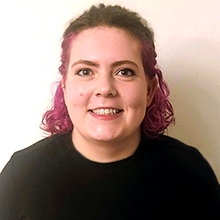 Caroline Faircloth
Caroline FairclothDepartment of Biology (Integrative)
Caroline is interested in studying the intersection of disease ecology and conservation biology. She is working on a project using a bioinformatics approach to study the transcriptional response to infection with the parasite Leucocytozoon in barn owls. After earning her master’s degree, she intends to pursue a PhD studying the immune physiology of fruit bats of genus Pteropus, with the intention of developing strategies to simultaneously protect bats from anthropogenic disruption and prevent future zoonotic spillover events. Currently, she works in the Animal Care Facility at SFSU. In her free time, she enjoys crochet and knitting.
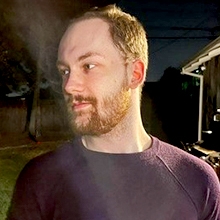 Kameron Gausling
Kameron GauslingDepartment of Physics & Astronomy
As an undergraduate at the University of Illinois at Urbana-Champaign, Kameron was part of the UIUC Astronomical Society and the Dobro Slovo (Slavic National Honor Society). His interest in both languages and astronomy continue at SFSU where he is currently investigating the behavior of the atmospheres of slowly rotating stars using the EXPRES spectrograph on the Lowell Discovery Telescope in Arizona. By looking at the velocity broadening of such stars, he will generate an empirical relationship between macroturbulent broadening and effective temperature that is calibrated for the EXPRES spectrograph.
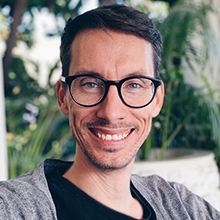 Jason Meintjes
Jason MeintjesDepartment of Mathematics
Jason’s particular interest is in algebraic geometry, and he is currently working on a thesis project on the moduli space of curves, which has been widely studied by mathematicians due to its applicability to diverse research areas within mathematics as well as in theoretical physics. The goal of this research is to give a concrete and accessible presentation of recent results that describe the moduli space explicitly. Prior to his academic career, Jason was a successful professional musician in his home country of South Africa. He moved with his wife and daughter to the U.S. in his late twenties and supported himself as a professional photographer while returning to school. Outside of school, some of Jason's hobbies are running and rock-climbing; his favorite climbing partner is his daughter.
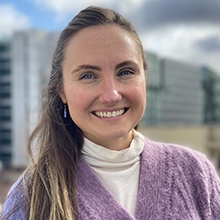 Milana Meyer
Milana MeyerDepartment of Chemistry (Biochemistry)
Milana is a passionate and dedicated individual with a strong interest in the field of Chemistry and a genuine curiosity for subjects like Quantum Mechanics and Solid-State Physics. As a non-traditional student, she has demonstrated significant academic rigor and is very excited to actively participate in research. Currently, she is working with Professor Ichimura on the analysis of lunar soils and soil analogues by ferromagnetic resonance spectroscopy (FMR) to better understand the effects of space weathering. Outside of academic activities, Milana enjoys a consistent yoga practice and hiking the beautiful natural parks of Northern California.
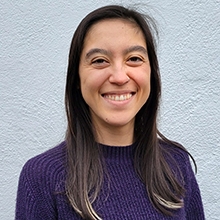 Kira Miller
Kira MillerDepartment of Biology (Integrative)
Kira combines her interests in ecology with her love of the mountains by studying amphibians in the Sierra Nevada. Her current research investigates the interactions between the amphibian skin microbiome and the amphibian chytrid fungus, Batrachochytrium dendrobatidis, across two frog species with differing susceptibilities. She strives to contribute to a more holistic understanding of disease resilience across systems and aid in the conservation of threatened species. Kira works as a graduate teaching assistant at SF State, where she enjoys getting students excited about biology. Outside of research, Kira enjoys the outdoors, traveling, and trying out fun recipes.
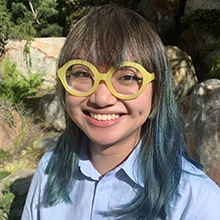 Devin Simbol
Devin SimbolDepartment of Chemistry
Devin‘s research project in Dr. Taro Amagata’s research group focuses on discovering next generation anti-cancer drug candidates from marine-derived actinomycetes. As part of this program, Devin has been investigating secondary metabolites produced by the actinomycete Streptomyces sp. CP59-55. This strain produces compounds with excellent selective cytotoxic effects against a prostate cancer cell line. In his free time, Devin enjoys painting portraits and climbing rocks.
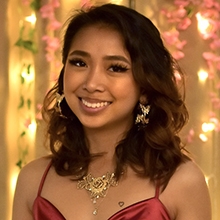 Alice Truong
Alice TruongDepartment of Biology (Integrative)
Alice is the first in her family to attend graduate school. Her research in Dr. Andrea Swei’s Tick-Borne Disease Ecology lab focuses on studying the effectiveness of a novel, reservoir-host targeted orally administered vaccine for Lyme disease against two regional strains of Borrelia burgdorferi, the pathogen that causes Lyme disease. She has multiple years of experience working in lab as an undergraduate research assistant at the University of the Pacific and as a field sampler for The Wine Group. She enjoys teaching and has mentored and taught various students in classes such as General Biology and Infectious Disease Ecology. Outside of research, Alice also enjoys volunteering at Infinitycares, a hospice located in Stockton, CA, where she calls her patients and their families weekly for wellness checks, and monthly for grief support. She also enjoys dog training, embroidery, and cooking.
STANFORD UNIVERSITY
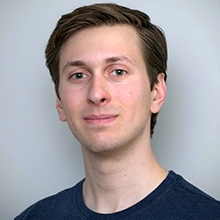 Scott Evan Berger
Scott Evan BergerDepartment of Biophysics
Scott studies vertebrate DNA replication initiation using emerging single molecule microscopy techniques and Xenopus egg extracts. He is also exploring DNA replication initiation in choanoflagellates, which are abundant unicellular marine eukaryotes, through an independent project funded by the research nonprofit New Science. Scott is dedicated to mentoring young scientists and has been involved with the Stanford FAST program since 2021. Outside of the lab, you will most likely catch him reading up on world history or taking macro photos of insects.
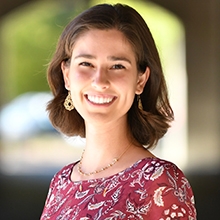 Lucia Brunel
Lucia BrunelDepartment of Chemical Engineering
KIMBALL FOUNDATION SCHOLARLucia Brunel obtained a BS and MS in Chemical Engineering from Northwestern University in 2018 and an M.Phil. in Materials Science from the University of Cambridge in 2019. At Stanford, her research focuses on the design of hydrogels that provide biological and mechanical cues to encapsulated living cells. She is especially interested in the application of these materials as bioinks for 3D bioprinting. Outside of the lab, Lucia is active on the executive boards of the Stanford Polymer Collective and the Graduate Society of Women Engineers.
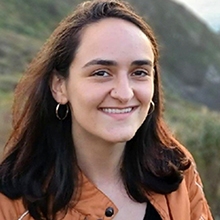 Mallory Harris
Mallory HarrisDepartment of Biology
Mallory studies how human behavior shapes infectious disease transmission. She uses quantitative methods to understand how infectious diseases spread through populations with social divisions, predict how climate change will affect malaria burden, and characterize sources of health misinformation. She earned her BA in Mathematics and Computational Biology from the University of Georgia, where she conducted research on predicting vector-borne disease outbreaks. As the co-president of Scientists Speak Up, she organizes seminars and workshops on communication and advocacy about scientific topics.
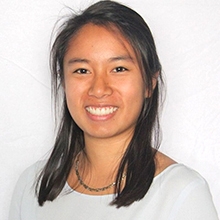 Rianna Jitosho
Rianna JitoshoDepartment of Mechanical Engineering
Rianna’s research interests include planning and controls, soft robotics, and mobile systems. Her current work focuses on leveraging reinforcement learning to enable autonomous agile maneuvers for soft robot arms. The work emphasizes the application of theoretical contributions to physical hardware. Outside of her academic pursuits, Rianna has gained industry experience at organizations including Jet Propulsion Laboratory and Honda Research Institute. In her free time, she enjoys outdoor activities and culinary adventures.
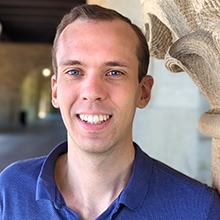 Matt Larson
Matt LarsonDepartment of Mathematics
Matt studies combinatorial algebraic geometry, which applies tools from algebraic geometry to combinatorial problems. Many combinatorial problems, especially those related to a particular type of combinatorial object called a matroid, can only be understood by constructing an algebraic variety associated to a matroid and applying a deep theorem from algebraic geometry. Matt’s work involves understanding the geometry of those varieties. Matt is involved in mentoring undergraduates through the directed reading program. Outside of work, Matt enjoys road biking and he is an international master of chess.
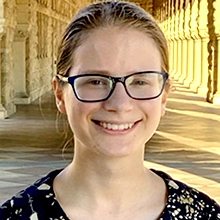 Anna Makar-Limanov
Anna Makar-LimanovDepartment of Chemistry
Anna is passionate about using chemistry to help tackle sustainability challenges. She is working on developing new resins for CLIP-3D printing to produce chemically recyclable materials. Anna received her BA magna cum laude with distinction in Chemistry and Mathematics from Amherst College, where she worked on metal alkoxide initiators for the ring-opening polymerization of cyclic esters. She was a Center for Sustainable Polymers Summer Undergraduate Fellow at University of Minnesota, Twin Cities. Outside of the lab, Anna enjoys singing in choirs, knitting, hiking, and listening to podcasts.
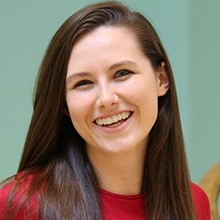 Callan Monette
Callan MonetteDepartment of Bioengineering
As part of Dr. Fan Yang’s lab, Callan works to develop 3D tissue engineered models of the bone cancer Osteosarcoma, seeking to screen and identify novel cancer therapies. Outside of the lab, Callan is also a passionate educator. She works for the Stanford Center for Teaching and Learning as a Graduate Teaching Consultant, providing training and professional development to graduate TAs. Furthermore, she co-designed a novel pedagogy-focused course that seeks to develop inclusive teaching, mentorship, and communication skills among Bioengineering graduate students.
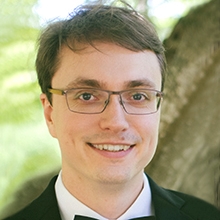 Nicholas O’Dea
Nicholas O’DeaDepartment of Physics
Nick is interested in quantum non-equilibrium dynamics with research investigating scarred eigenstates, slow dynamics in the presence of rapid driving, and absorbing state transitions in quantum circuits. At Stanford, he received the Physics Department’s Paul Kirkpatrick Award recognizing commitment to teaching. Nick enjoys reading and is an active member of four different book clubs.
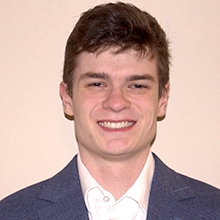 Alec Shelley
Alec ShelleyDepartment of Applied Physics
Alec is a gregarious student who loves cooking, teaching, and chess. He has a broad interest in physics and math, and he is always eager to learn something new. He was elected president of the graduate students of applied physics and physics at Stanford, where he leads social and outreach events. He was admitted to UC Berkeley at age 14, and graduated magna cum laude with a physics and applied math double major. He has researched sea level rise, condensed matter physics, and atomic physics, and is currently interested in how fluctuations and noise can be used to predict the behavior of solids.
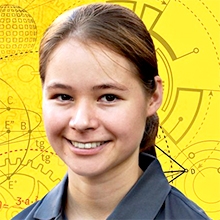 Richelle Smith
Richelle SmithDepartment of Electrical Engineering
WILLIAM K. BOWES, JR. FOUNDATION SCHOLARRichelle’s research interests include energy-efficient systems, analog and radio-frequency integrated circuit design, oscillators, wireline transceivers, and brain-inspired computing. Her current projects include high-speed, energy-efficient modulation schemes for digital communications. Lowering the power consumption of the computer chips and transceivers that handle our communication traffic will reduce our carbon footprint on the planet. In addition to addressing computing’s energy overhead from communications, Richelle’s research also seeks to reduce the energy from computing operations by rethinking the architecture and circuits. Richelle has held internship positions at Linear Technology, Rambus Labs, Stanford Brains in Silicon Lab, and TDK-InvenSense. Outside of research, she enjoys horseback riding/horse polo, playing electric guitar/bass, and growing carnivorous plants.
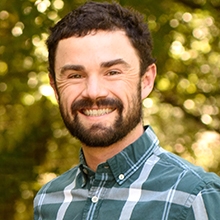 Paul Summers
Paul SummersDepartment of Geophysics
KIMBALL FOUNDATION SCHOLARPaul is working with the Thwaites Interdisciplinary Margin Evolution group focusing on numerical modeling of the physical processes governing Antarctic shear margins, with special focus on Thwaites Glacier. He also works with the Stanford Radio Glaciology group on resolving thermal anomalies in ice. Paul’s research interests focus on data model integration in the cryosphere. He is a mentor to undergraduate researchers and passionate about making glaciology more accessible for rising scientists. He also enjoys running, climbing, and sewing in his free time.
UNIVERSITY OF CALIFORNIA, BERKELEY
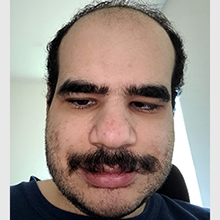 Ahmad Abassi
Ahmad AbassiDepartment of Mathematics
Ahmad completed a double bachelor’s degree in Computer Engineering and Mathematics and a master’s degree in Electrical Engineering from the Technion in Israel. His current research focus is on moving boundary problems in fluid mechanics using high-performance computing and asymptotic expansion methods. In addition to his studies, Ahmad is a passionate educator with four years of teaching experience at the Technion and UC Berkeley, has years of work experience in the life sciences, and is interested in linguistics and world cultures.
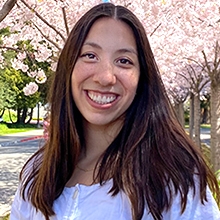 Jacquelyn Galvez
Jacquelyn GalvezDepartment of Integrative Biology
Jackie is a native of sunny Southern California, where she grew up fishing in the highly diverse watersheds around the Golden State. Her current research in the Functional Anatomy and Vertebrate Evolution Laboratory focuses on the skeletal changes in freshwater fish populations that relate to varying migratory behaviors, food preferences, and seasonal changes. Her current study animals include cichlids, trouts, and chars. Jackie is passionate about community building and public outreach, and has worked tirelessly to organize and lead community events in her department and the Museum of Vertebrate Zoology on the UC Berkeley campus.
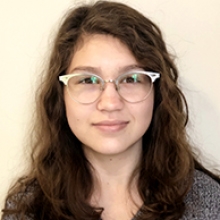 Cynthia “Abby” Harris
Cynthia “Abby” HarrisDepartment of Molecular & Cell Biology
Ferroptosis is an iron-dependent type of cell death that results from the accumulation of reactive lipid peroxides. Abby is looking into elucidating the participation of copper and potentially other redox-active metals in ferroptosis, with the aim of expanding our understanding of its mechanism and allowing the development of new ways to induce ferroptic cell death in cancer and other disorders. She pursued another side of cancer research as an intern at Genentech, where she worked on identifying novel drug targets.
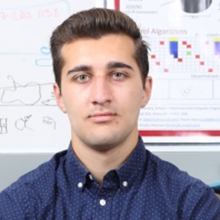 Logan Horowitz
Logan HorowitzDepartment of Electrical Engineering & Computer Science
Logan is interested in working on novel power converter design, focusing on applications in renewables integration and implementation. Commercial air travel accounts for a large proportion of pollution and wasted energy all over the world, but new technologies are emerging which have enabled hybrid aircraft. Logan’s project focuses on the design optimizations required for a high-power-density, high-efficiency, high-frequency electric drivetrain.
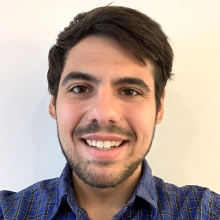 Lourenço Martins
Lourenço MartinsDepartment of Integrative Biology
From a young age Lourenço always knew he wanted to be a biologist, having spent his childhood chasing after the bugs in his family’s backyard garden. He is interested in understanding how some species can have a vast species distribution; how one genome is able to cope with vastly different environmental factors like climate. At UC Berkeley, he is using genomics to study the evolution of cold tolerance in the willow leaf beetle, Chrysomela aeneicollis, whose species distribution ranges from the California coast to the Canadian Rockies. As an immigrant and first-generation college student, Lourenço strives to make the science community more accessible and inclusive to people of all identities.
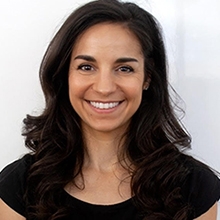 Maria McSharry
Maria McSharryDepartment of Molecular & Cell Biology
Maria’s research in Dr. Liana Lareau’s lab leverages genetic engineering in budding yeast to better understand how synonymous codon choice impacts protein output. In addition to her lab work, Maria engages the wider community in science: she has a track record of volunteering in K-12 schools as a science fair judge and as a Bay Area Scientists in Schools volunteer. She is a contributing author at GeneBites, in line with her aspiration of making cutting-edge science accessible to a wider audience.
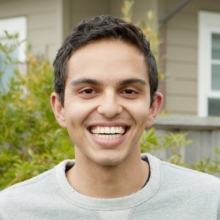 Reesab "Reese" Pathak
Reesab "Reese" PathakDepartment of Computer Science
Reese’s current areas of interest include distributed and non-convex optimization problems as well as the estimation problems with deep ties to applied probability, such as matrix completion and community detection. Recently he has been working on algorithms for distributed optimization in large networks. These types of problems arise in many modern applications of statistical learning.
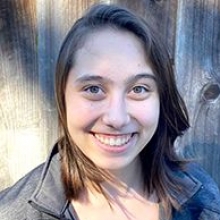 Robin Peter
Robin PeterDepartment of Nuclear Engineering
RAMSAY FAMILY FOUNDATION SCHOLARRobin is pursuing research at the intersection of particle physics, quantitative biology, and humanitarian application. She is currently involved in projects in medical imaging, radiation detection, and radiation therapy. Her multidisciplinary interests stem from an eclectic mix of past research endeavors: memory device simulation with IBM Research, construction of a spark chamber, and studies in cuttlefish camouflage.
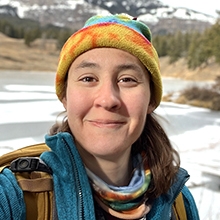 Mara Reed
Mara ReedDepartment of Earth & Planetary Science
Geyser study has important implications for volcanology, mineral exploration, and the search for life’s origins. Mara‘s research seeks to understand the factors that influence geyser eruption timing and to apply lessons learned from geyser study to volcanology. She is passionate about integrating the public into monitoring efforts and volunteers as a scientific advisor for GeyserTimes, a crowdsourced database of geyser observations. When she’s not thinking about geysers, Mara dabbles in cave photography and especially enjoys organizing beginner trips for Bay Area caving clubs.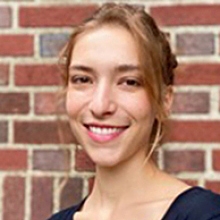 Sophie Ruehr
Sophie RuehrDepartment of Environmental Science, Policy & Management
Sophie’s graduate work is focused on the ecosystem-scale dynamics of water cycling. Using data from satellites, she studies the links between the carbon and water cycles over space and time to better understand how the terrestrial land sink may respond to climate extremes in the future. Her research has implications for both sustainable water management and predicting future climate change.
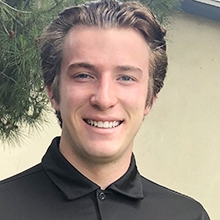 Cooper Selco
Cooper SelcoDepartment of Applied Science & Technology
During his undergraduate education, Cooper did research in experimental quantum science, published several papers related to this research in well-known journals and presented them at leading conferences. He also won various awards and many internal fellowships from his university (USC). In his graduate work at UC Berkeley, Cooper is interested in performing research related to quantum sensing and nanoscale spin dynamics. Outside of research, Cooper enjoys both playing and watching sports such as basketball, soccer, and Formula One.
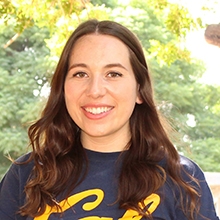 Rachelle Stark
Rachelle StarkDepartment of Metabolic Biology
As an undergraduate at UCLA, Rachelle utilized murine models to study the molecular mechanisms behind Duchenne muscular dystrophy, a severe muscle wasting disease. Additionally, she participated in a summer research internship in Dr. Jicheng Gong’s lab at Peking University in Beijing, China, where she performed experiments to detect biomarkers of recurrent lung adenocarcinoma. Rachelle enjoyed her molecular biology education but is also intrigued by the relationship between diet and disease, and therefore chose to pursue a PhD in Metabolic Biology.
UNIVERSITY OF CALIFORNIA, DAVIS
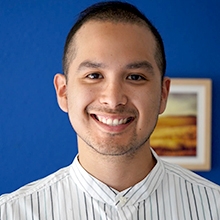 Jonathan Aguiñaga
Jonathan AguiñagaPopulation Biology Graduate Group
Jon is a first-generation Mexican American who believes education is his key to a better future. He is broadly interested in understanding how animals, including humans, process information from their environments to make decisions. In his dissertation work, he aims to understand how single-species animal groups vary in behavior from mixed-species groups. To assess between-species differences, he must first quantify the level of within-species variation in behavior. Currently, he investigates for within- and between-species differences in foraging, exploration, and antipredator behavior in two poecilid fish. In working towards this goal, Jon has also mentored four undergraduates and five high school students in behavioral experimentation. Outside of academia, he spends much of his time photographing nature, cooking, gardening, and playing with his dog.
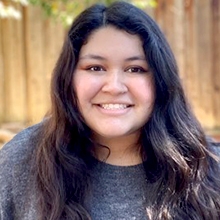 Amanda Caceres
Amanda CaceresDepartment of Chemistry
Amanda is researching the link between iron misregulation and diabetes. Although correlations are documented between iron-associated phenotypes and diabetes, reports remain observational with little insight into the pathways and factors underlying these links. Her long-term research goals involve leveraging in vivo disease models coupled to multi-omics data to understand disease pathogenesis. Of particular interest to her are diseases that disproportionately affect women and communities of color; especially given that both groups experience lower quality healthcare and worse health outcomes. Outside of the laboratory Amanda serves as Chair of the Chemistry Graduate Student Association. She is also involved in outreach activities, including STEM for Girls, an outreach event that engages minority students in underserved communities.
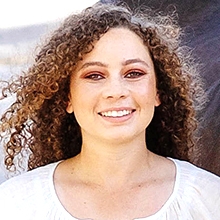 Cassidy Cooper
Cassidy CooperAnimal Behavior Graduate Group
Cassidy completed her BS and MS in Dr. John Eme’s comparative physiology lab at CSU San Marcos, where she published two first-author papers while engaging in teaching and lab-based mentorship. At UC Davis she is working with Dr. Nann Fangue to complete an integrative dissertation assessing physiology and behavior of California native fishes. Cassidy’s research is grounded in conservation, and is readily used by decision-making bodies such as the California State Water Resources Control Board. Cassidy is an editor for The Ethogram (the official science communication platform of Animal Behavior at UC Davis) and their middle-school outreach team. Recently, she collaboratively developed a series of public resources to foster student interest in STEM and make animal behavior science more broadly accessible. Through this and her involvement with the Animal Behavior Diversity and Inclusion Committee, Cassidy upholds a strong commitment to mentorship, training, and collaborative and inclusive science.
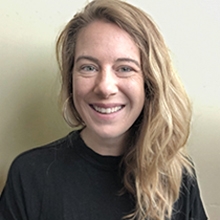 Jane Fudyma
Jane FudymaDepartment of Soils & Biogeochemistry
Jane is researching soil viral ecology in natural systems. More specifically, her research focuses on understanding the fate and transport of viruses in complex soil matrices, how the heterogeneity of soil and viruses can dictate where a virus can move, and how these properties affect small scale ecological processes. Before graduate school, she received her BS in General Science from Seattle University, spent nearly five years working in mining bioremediation, and spent two years in academia in an environmental metabolomics lab. Jane loves fieldwork and works as an instructor for UC undergraduates to teach field methods, safety, and introduce students to outdoor experiences. In her spare time, she enjoys attending live music, camping, and skiing.
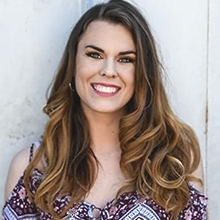 Carissa Garrity
Carissa GarrityIntegrative Pathobiology
Carissa is finishing the fourth year of her graduate studies in the lab of Dr. Natalia Vapniarsky. Her research project focuses on musculoskeletal biology and regeneration with specific focus on cartilage tissue engineering. Carissa is the first in her family to pursue a graduate degree and came to the program after completing a bachelor's degree in animal science. Her heart is with rural communities and Aggs in the area. She has done lots of volunteer work to support and communicate recent scientific advances to these communities.
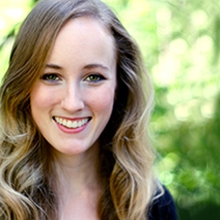 Elizabeth Grant
Elizabeth GrantGeology Graduate Group
Elizabeth studies magma assembly and storage timescales at volcanoes in New Zealand. She uses a suite of geochemical tools, including radioisotope chemistry, to understand the timescales on which these large eruptions are built prior to eruption. Most recently she spent a year working with the U.S.G.S. conducting phase equilibrium experiments to determine the pressure and temperature conditions at which caldera-forming magmas are stored in the crust. Elizabeth is a native of Seattle and obtained her BS in geology at the University of Washington. Outside of academia she enjoys dance, theatre, and music.
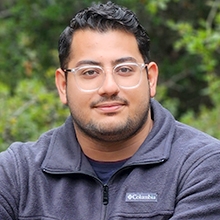 Mohammed “Mo” Hashemian
Mohammed “Mo” HashemianDepartment of Chemistry
Mo’s research pertains to the human DNA repair enzyme, MUTYH, which plays a critical role in repairing DNA damage and is associated with an increased predisposition to cancer when dysfunctional. His work focuses on characterizing the structural and biochemical features of inherited variants of MUTYH, and how they may be implicated in dysfunction and disease.
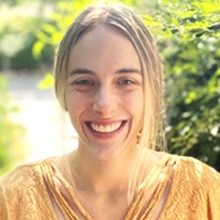 Macall Hock
Macall HockEcology Graduate Group
Macall graduated with a BS in chemical and biological engineering from Colorado State University. After working for a few years as an environmental consultant, she started graduate school to pursue her interests in researching climate change in the Arctic. Always interested in aquatic chemistry, she is focusing her doctoral work on examining the effects of a warming Arctic ecosystem on stream carbon cycling in northern Alaska. Her project aims to quantify carbon transport across the tundra from drainage streams and determine how various landscape types and permafrost states might influence or control carbon fluxes. In her career, she hopes to work bridging Arctic research with Arctic conservation. In her spare time, Macall enjoys spending time outside with her two dogs and practicing yoga.
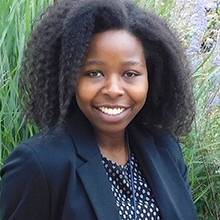 Doreen Joseph
Doreen JosephDepartment of Computer Science
AGILENT TECHNOLOGIES FOUNDATION SCHOLARDoreen was the first Black woman to earn a BS in Cyber Security Engineering from George Mason University. Broadly defined, her research interests include firmware security, applications of machine learning in cyber security, securing the Internet of Things (IoT), and the design of cyber-resilient systems. At UC Davis, she is pursuing research in firmware binary security analysis for embedded systems. As an active student leader, she serves on the Chancellor’s Graduate and Professional Student Advisory Board, and leads in student organizations like the Black Graduate and Professional Student Association, and the Graduate Scholars of Color+ organization. Doreen is committed to public service and is eager to empower students who are underrepresented and marginalized in STEM. She aims to be a global advocate for accessible, inclusive, and equitable high-quality education for all. In her free time, she enjoys learning new skills, reading, traveling, exploring nature, and exercising.
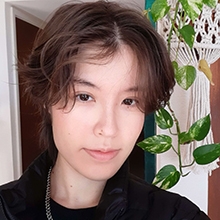 Sarah King
Sarah KingDepartment of Earth & Planetary Sciences
Sarah is passionate about the ecology of extreme ecosystems and planetary habitability. She is developing mathematical models to quantify the mechanisms that drive the spatial self-organization of benthic microbial mats in Antarctic lakes. Through this, she aims to better understand microbial ecology and how these communities are responding to climate change. Sarah is interested in 3D visualization and virtual reality as a research and educational tool and has developed an interactive reconstruction of Mars to teach planetary geology to over 800 students. Outside of research, Sarah enjoys cultivating fungi and a variety of heirloom tomatoes.
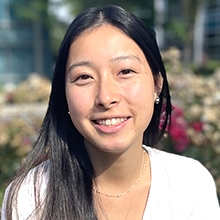 Quimby Lee
Quimby LeeNeuroscience Graduate Group
As a neuroengineer, Quimby’s goal is to promote positive outcomes from neurodevelopmental diagnoses by developing accessible neuroimaging tools to better understand and characterize human brain development and its heterogeneous disorders. Her current project optimizes an accessible resting-state functional MRI metric of cerebrovascular function for pediatric populations and evaluates whether changes in cerebrovascular function may explain brain network and behavior differences in autistic compared to typical development.
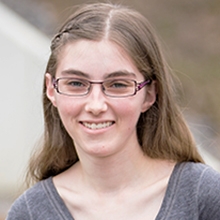 Meredith Lutz
Meredith LutzAnimal Behavior Graduate Group
Meredith’s research examines how animal societies respond to environmental change over multiple temporal and spatial scales. Since 2015, she has conducted a long-term comparative study on lemur social behavior in the Maromizaha Protected Area, in collaboration with local managers, scientists, guides, and graduate students from the University of Antananarivo. To complement her field research, she is also undertaking a phylogenetic comparative analysis to explore the range of documented behavioral flexibility across primates. Meredith is also part of the inaugural cohort of the Future Undergraduate Science Educators program. Meredith is passionate about providing opportunities for undergraduates to get involved in research, by mentoring six students on their senior theses and co-leading a team of 226 additional interns in the phylogenetic comparative analysis of behavioral flexibility.
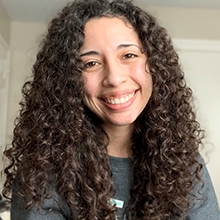 Maria Angelica Muñoz
Maria Angelica MuñozDepartment of Pharmacology & Toxicology
Maria’s research interests include the mechanisms by which organophosphate pesticides and nerve agents cause neurotoxicity, and leveraging this information to develop more effective therapeutic strategies to reduce chronic adverse neurological outcomes in individuals who survive acute poisoning with these neurotoxic chemicals. Currently she is working to develop a pediatric model of organophosphate intoxication. Maria has been involved in recruitment activities for her graduate program in Pharmacology and Toxicology, and will continue participating in this service activity during the academic year. Outside the laboratory, Maria enjoys running, trying new foods and visiting coffee shops.
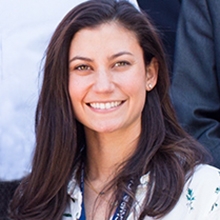 Julia Owen
Julia OwenEcology Graduate Group
Julia studies the evolution and ecology of wildlife using genetic and genomic tools. She recently published a study using DNA from scats to identify individual bears and estimate their abundance in the Tahoe Basin. Her current research uses whole genome sequencing to illuminate the evolutionary history of the spotted skunk species complex. Julia has been awarded several fellowships/scholarships and has presented her research at multiple national and regional conferences. She is committed to helping other first-generation college students and other underserved populations, and recently received an Outstanding Teaching Assistant Award. Julia enjoys running and is currently training to run the California International Marathon.
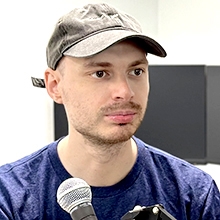 Tyler Singer-Clark
Tyler Singer-ClarkDepartment of Biomedical Engineering
Tyler graduated from MIT with a degree in Computer Science and Engineering. After five years in industry developing business software with the startup MaestroQA, he joined the BrainGate research team at Brown University as a Research Engineer, with a focus on delivering an intracortical brain-computer interface (iBCI) that can be used continuously by a paralyzed user in their own home to control their personal computing devices. Transitioning to speech iBCI in particular, he joined the UC Davis Neuroprosthetics Lab as a part-time Research Engineer and then as a full-time Biomedical Engineering PhD student in Spring 2023. His current project attempts to decode attempted tongue movements from neural activity in the brain in order to control a computer cursor, and eventually an artificial (software) vocal tract to create a speech neuroprosthetic device. In addition to enjoying just about every sport, Tyler enjoys playing and reading about chess.
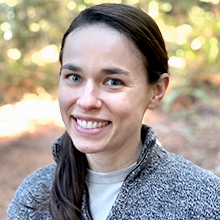 Devinn Sinnott
Devinn SinnottIntegrative Pathobiology
Devinn received her BA in Pre-Professional Zoology from Ohio Wesleyan University in 2013 and her DVM summa cum laude from the Ohio State University College of Veterinary Medicine in 2017. In veterinary school she developed an interest in wildlife diseases and parasitology through her research investigating protozoal pathogens in wild canids. She completed a residency in Anatomic Pathology with an emphasis on zoo/wildlife pathology through the UC Davis School of Veterinary Medicine and the San Diego Zoo and became a Diplomate of the American College of Veterinary Pathology in 2021. Devinn’s PhD research project involves investigating relationships between genetic types of Sarcocystis neurona and fatal infections in southern sea otters in California.
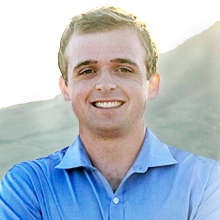 Ross Wohlgemuth
Ross WohlgemuthDepartment of Molecular, Cellular & Integrative Physiology
Ross joined Dr. Lucas Smith’s lab in March 2020 as one of his first PhD students. While the pandemic made it difficult for him to get started in the lab, he has shown great curiosity for skeletal muscle physiology research. Ross has learned and utilized multiple techniques with the Smith lab, which has led to multiple publications including one as first author. His PhD research project aims to identify the architectural changes to the skeletal muscle ECM that occur in disease and elucidate impact of these architectural changes to muscle biomechanical function. In addition to his research success, Ross is a big proponent of the lab’s social events outside of work, including intramural volleyball and happy hour celebrations.
UNIVERSITY OF CALIFORNIA, MERCED
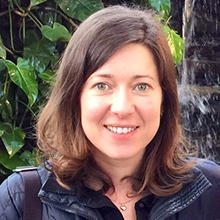 Hope Hauptman
Hope HauptmanDepartment of Environmental Systems
DANAHER FOUNDATION SCHOLARHope’s research centers around 1,2,3-Trichloropropane (TCP) a suspected legacy contaminant and probable human carcinogen that contaminates thousands of wells in the United States, Europe, and Asia. Hope aims for clean drinking water for all. She uses machine learning to predict TCP levels in groundwater and will evaluate household treatments and almond-based carbon to remove TCP from drinking water. She has published a systematic review of TCP treatment technologies and a policy paper. She taught high school science for ten+ years and was a U.S. Peace Corps volunteer in Kenya. Hope volunteers at a community garden and pantry to provide fresh produce for those in need.
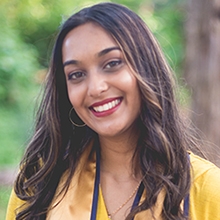 Zunaira Iqbal
Zunaira IqbalDepartment of Cognitive & Information Sciences
Zunaira graduated from UC Davis with a BS in Psychology with an emphasis in biology. Inspired by her undergraduate work in cognitive neurolinguistics, Zunaira’s research passion is at the intersection of bilingual language processing and neurobiology. Currently, her work looks at understanding how Spanish-English bilingual phonetic representations differ from English monolinguals, through both behavioral and EEG experiments. She is part of UC Merced’s NSF Research Traineeship (NRT) Program, through which she has received several fellowships. Outside of research, Zunaira enjoys watching movies, journaling, art, and taking care of her house plants.
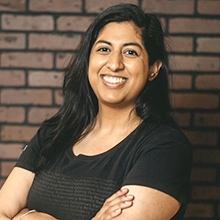 Arabi Seshappan
Arabi SeshappanDepartment of Physics
AGILENT TECHNOLOGIES FOUNDATION SCHOLARA high school dropout and community college transfer, Arabi obtained her BS in Chemistry from UCLA. Following this, she was a Bridge-to-Doctorate Fellow at CSU Los Angeles, where she realized her passion lied in physics. In the UC Merced graduate program, she studies the physics of materials through computational modeling methods. Potential applications of this work include building better solar cell materials or qubits for quantum computing. Additionally, Arabi is highly passionate about increasing diversity in academia; she has been elected to the Graduate Dean’s Advisory Committee on Diversity (GDACD) twice, and she serves as a graduate mentor for the Undergraduate Research Opportunities Center (UROC) on campus. In her spare time, Arabi rides horses and has three dogs.
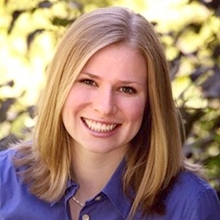 Alauna Wheeler
Alauna WheelerDepartment of Physics
A PhD candidate and mother to two young children, Alauna’s research interests include soft matter and self-assembly of biological systems. Her current projects include a study of the self-assembly of nanoparticles in a liquid crystal solvent undergoing a phase transition, self-assembly of the COVID viral particle, and the effect of e-cigarette chemical additives on lung surfactants. She also recently published a collaborative paper on the structure of electrosensory gels in cartilaginous fishes. She is the recipient of many honors and awards, including the 2020-2021 Outstanding Physics TA Award. Pre-PhD, Alauna spent 3+ years as a rocket propulsion and testing engineer. Her current outreach focuses on conducting hands-on science activities for elementary students using common household items. She is developing an accompanying YouTube channel so kids everywhere can do the activities at home with their adults. She is also a bargaining team member for the UC Student Researcher’s Union, negotiating for more equitable working conditions. Alauna enjoys small boat sailing, visiting national and state parks with family, and board games for young children
UNIVERSITY OF CALIFORNIA, SAN FRANCISCO
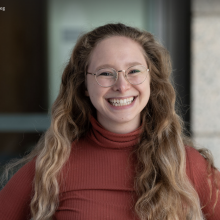 Jessica Blumenfeld
Jessica BlumenfeldDepartment of Neuroscience
Jessie is interested in understanding the cellular pathways underlying neurodegenerative diseases. She began her studies at MIT, where she majored in bioengineering with a minor in neuroscience. Following graduation, she joined Denali Therapeutics where she assessed the efficacy of therapeutics for various neurodegenerative disorders. Now as a fourth-year neuroscience graduate student at the Gladstone Institutes, Jessie seeks to understand how APOE4 genotypes may differentially drive neuronal vulnerability in Alzheimer’s Disease. In particular, she investigates how neuronal MHC-I – an immune factor seemingly regulated by APOE expression – mediates downstream AD pathologies. Beyond lab, Jessie enjoys cooking, traveling, SCUBA diving, and exploring San Francisco.
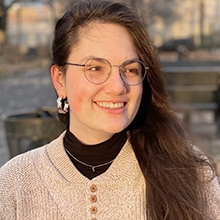 Camille Derderian
Camille DerderianDepartments of Biochemistry & Molecular Biology
Camille found her passion for fundamental biological research as a technician in a neuro-oncology laboratory at Memorial Sloan Kettering Cancer Center. In 2021, she began her graduate studies at UCSF and became fascinated with understanding how cells can build, maintain, and use distinct compartments and structures for cellular communication. Her research focuses on the primary cilium, an evolutionarily ancient signaling organelle, and her thesis work is guided by a deep interest in understanding how the membrane surrounding the cilium serves as a unique environment that contributes to the communication of complex information. Outside of bench work, Camille is dedicated to sharing accessible, empowering, and accurate health and science information to students in her local community.
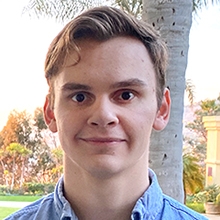 Joseph Germino
Joseph GerminoDepartment of Biomedical Sciences
Joe’s research interests center around gaining a better understanding of the mechanisms responsible for regulating the complex interactions of the immune system to prevent uncontrolled immune responses that could be detrimental to the host’s health while still maintaining adequate host defense. Joe is also interested in extending his education in computational biology by developing and applying cutting edge bioinformatics tools, particularly in the field of single-cell multiomics, to help answer some of the longstanding questions about immune tolerance alongside traditional wet lab approaches.
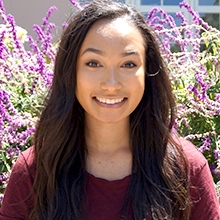 Chloe Ghent
Chloe GhentDepartments of Biochemistry & Molecular Biology
Chloe is interested in understanding biological processes through a biochemical perspective. She began conducting protein biochemistry research as a lab technician studying chromosome segregation before joining her current graduate lab. Her thesis work focuses on understanding how the regulation of a bacterial antibiotic resistance gene is sensitized to the presence of antibiotic through a protein translation stalling pathway. Combining microbiology, genetics, and biochemical techniques, she hopes to understand the feedback mechanism that controls expression of this pervasive resistance gene. This understanding can potentially help inform the development of new antibiotics which circumvent bacterial resistance mechanisms. Outside of lab, Chloe enjoys dancing, longboarding, and exploring San Francisco.
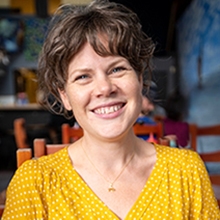 Carolyn Smith Hughes
Carolyn Smith HughesDepartment of Epidemiology & Translational Science
Carolyn is passionate about helping to improve experiences of care and clinical outcomes for birthing persons and their infants in the US and around the world. As a survivor of severe intrapartum and postpartum complications and birth trauma, Carolyn focuses on research in the provision of person-centered prenatal, maternity, and postpartum care; the social and clinical causes of hypertensive disorders of pregnancy (HDPs); and strategies to improve outcomes among those who experience HDPs. In her free time, Carolyn enjoys cooking, long walks, reading, and learning about sea creatures with her young son and her husband.
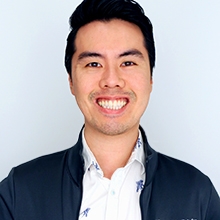 Darwin Kwok
Darwin KwokDepartment of Biomedical Sciences
Darwin is a computational cancer immunologist whose research focuses on engineering novel neoantigen discovery pipelines for immunotherapy. In his biomedical engineering and immunology training at Carnegie Mellon and Yale, Darwin developed and published innovative software for investigating immunotherapy-mediated immune infiltration. At UCSF, he addresses the challenges of intratumoral heterogeneity by characterizing tumor-wide splice-derived neoantigen targets across various cancer types and developing vaccine and T-cell-based therapies that target them. Beyond science, Darwin is heavily involved with his student body and outreach as the President of ASGD and the coordinator of UCSF-LSRP, and he enjoys sharing his music with friends as a producer and DJ.
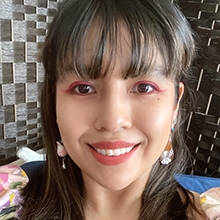 Nilsa La Cunza
Nilsa La CunzaDepartment of Pharmaceutical Sciences & Pharmacogenomics
Nilsa is a biomedical engineer whose research focuses on dissecting molecular mechanisms that regulate retinal pigment epithelium (RPE) health, which is the primary site of injury in age-related macular degeneration (AMD). Using cutting-edge live imaging technology, she has discovered a novel mechanism involving liquid-liquid phase separation that links mitochondrial fragmentation in the RPE with the formation of lipid-protein aggregates called drusen, which are a hallmark of AMD. Nilsa is an executive board member of the UCSF SACNAS chapter, where she is passionate about mentorship and empowering underrepresented minorities to become leaders in STEM. Nilsa enjoys hosting dinner parties, buying plants, and traveling.
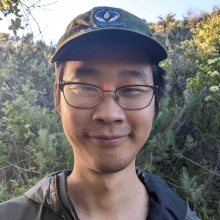 Alex Jihun Lee
Alex Jihun LeeDepartment of Neurology
Alex is broadly interested in computational biology and computer science. His background is in bioengineering and neuroscience research, and he received a BA in Biology from Vassar College. His thesis work focuses on the use of machine learning to help scientists understand large and complex datasets in biology and biomedicine. Specifically, his current research asks whether new spatial genomics techniques can help us understand the cellular organization of different subregions in the mouse brain and potentially uncover unknown neural circuits. Outside of the lab, Alex enjoys cooking, hiking, and taking care of his succulents.
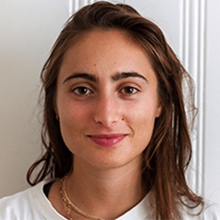 Rachel O’Sullivan
Rachel O’SullivanDepartment of Neuroscience
Rachel majored in biology with a concentration in neuroscience at Williams College. After graduation, she worked at a biotech startup, Kallyope, studying the gut-brain axis and exploring novel cell-types along this axis that could be targeted by therapeutics. Now, at UCSF, she is interested in understanding the heterogeneous circuitry of the ventral hippocampus (vHPC). vHPC sends non-overlapping projections to many downstream brain areas and ultimately promotes the selection of a diverse array of motivated behavioral responses. She wants to identify how these projections differ in terms of the emotionally salient information they encode and the adaptive reactions they promote. Outside of lab, Rachel loves to spend time outdoors, skiing, biking, running, and surfing.
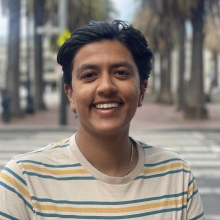 Sruthi Raguveer
Sruthi RaguveerDepartment of Chemistry and Chemical Biology
As an undergraduate at Stanford, Sruthi researched the cytotoxic effects of protein-drug conjugates. After graduating, they worked on novel bispecific antibodies at Soteria Biotherapeutics and EpiBiologics. At UCSF, they plan to continue studying the therapeutic applications of proteins and hope to develop cancer immunotherapies in their future career. Outside of research, Sruthi enjoys cooking for their partner and friends, making small leather goods, and playing trivia.
Devin SchoenDepartment of Bioengineering
Devin is passionate about bridging the realms of physics and medical sciences. With a BS in Physics and an MS in Medical Physics, she is currently pursuing a PhD as part of a joint program between UC Berkeley and UCSF. Working within UCSF's renowned radiology department, her research focuses on utilizing multi-modal MRI data to develop a machine learning model for predicting outcomes of Deep Brain Stimulation (DBS) in Parkinson's Disease. Committed to the principles of open and reproducible science, Devin also contributes to MRM Highlights magazine, conducting and publishing interviews with magnetic resonance researchers who are driving forward open science initiatives. In her leisure time, Devin enjoys exploring the art of crochet, engaging in stimulating board games, and delving into the history of science.
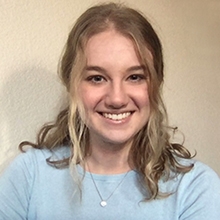 Lauren Shechtman
Lauren ShechtmanDepartment of Developmental & Stem Cell Biology
Lauren discovered her passion for stem cell and developmental biology as a research assistant in the Barlow lab at CU Anschutz, which studies taste receptor cell development and regeneration. At UCSF, she aims to further explore the cellular and molecular mechanisms regulating stem cells with the hope of building on these findings in the context of regenerative medicine treatments. As a member of the Roose lab, she plans to investigate epithelial regeneration in the context of the intestinal stem cell niche. Lauren is also passionate about scientific mentoring and teaching. In her free time, she enjoys hiking, volleyball, scuba diving, yoga, and exploring the Bay Area.
UNIVERSITY OF CALIFORNIA, SANTA CRUZ
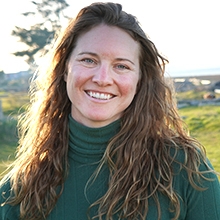 Anne Beulke
Anne BeulkeDepartment of Ocean Sciences
WILDCAT COVE FOUNDATION SCHOLARAnne studies heritable traits connected to migration behaviors in Chinook salmon and steelhead, using molecular tools to answer questions about salmon ecology and improve conservation efforts. Prior to graduate school, she completed molecular biology and field ecology research, and then worked as a field biological science technician for the U.S. Forest Service. In Anne’s free time she enjoys running, hiking, and biking.
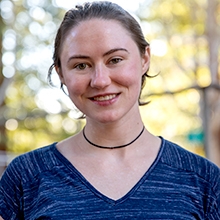 Madelyn Broome
Madelyn BroomeDepartment of Astronomy & Astrophysics
Madelyn currently works on exoplanet theory with Ruth Murray-Clay at UC Santa Cruz. She is an American Astronomical Society National Osterbrock Leadership Program Fellow and a UCSC Graduate Pedagogy Fellow, both of which allow her to pursue her lifelong commitment to excite, engage and elevate historically-excluded learners in STEM, especially other Native American students and young women. Passionate about making science accessible, she has written for a variety of publications over the years and currently co-runs the UC’s Ask and Astronomer program. When she is not mentoring students, she is coaching them as assistant coach for the UCSC Women’s Rugby team.
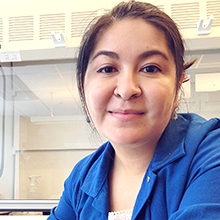 Amanda Carbajal
Amanda CarbajalDepartment of Molecular, Cell & Developmental Biology
Amanda has a passion for biology and a lot of experience; she worked in many unique labs at UCSF for her MS, and has held internships in industry and at NASA. She has published twice, with more pending. As a Latina woman growing up in an underserved community, she overcame many barriers, including socio-economic ones, to pursue science. Currently, her work involves leveraging genetics, molecular modeling, medicinal chemistry and genomics to understand how exposure to different classes of fluoroquinolone antibiotics provokes resistance mutations clinically observed. Amanda recently earned the prestigious UC Doctoral Diversity Initiative Award. Outside of lab, she actively helps other students and is a photographer and contemporary dancer.
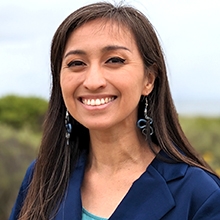 Elsie Carrillo
Elsie CarrilloDepartment of Ecology & Evolutionary Biology
Elsie seeks to understand the physiology, behavior and evolution of a semi-aquatic lifestyle using garter snakes as a model organism. She is currently investigating whether garter snakes are able to rebreathe air from narial bubbles they produce when underwater. Elsie was recently awarded the Delta Science Fellowship to collaborate with USGS to study predator-prey dynamics of semi-aquatic snakes along the Sacramento-San Joaquin River Delta. As a graduate of the Stanford Teacher Education Program, six years teaching K-12 science, winning the Outstanding Teaching Assistant award and then serving as a graduate student instructor, Elsie aims to become a professor to help recruit and retain first-generation and underrepresented students in STEM and to help all students develop their scientific identities. Elsie enjoys celebrating diverse aquatic life through art; she and her art were featured on Santa Cruz County Naturalists. She also plays flute in the University Jazz Ensemble.
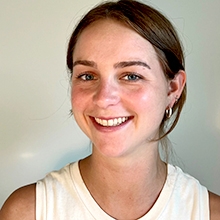 Gillian Dohrn
Gillian DohrnScience Communication Master’s Program
Gillian graduated from Colorado College in 2019 with a bachelor's degree in molecular and cellular biology and a minor in journalism. Her undergraduate research endeavors explored topics in microbiology and immunology. She started working in communications at Keystone Symposia after graduating and went on to join the editorial team at Springer Nature and then Frontiers. She is pursuing a master’s degree in science communication and aspires to use her background in biology to explore fresh perspectives on health and the human body.
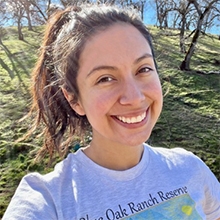 Amanda Donaldson
Amanda DonaldsonDepartment of Earth & Planetary Studies
Amanda is an ecohydrologist who studies how the structure of Earth’s surface and near surface environments dictates how water moves and is stored, and in turn, how the fate of water influences the evolution of those environments. Amanda has received numerous awards to support her research. In addition, she is heavily engaged in teaching and diversity, equity, and inclusion activities. As a 2022 Graduate Student Pedagogy Fellow, she developed and implemented a 10-week course to train graduate student teaching assistants to implement equitable teaching strategies within their classrooms. In her spare time, Amanda enjoys building community through organizing art showcases and attending the local Santa Cruz Shakespeare Theatre performances.
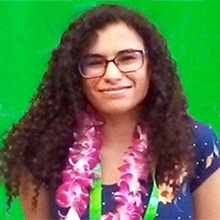 Yasmine Elshenawi
Yasmine ElshenawiDepartment of Microbiology & Environmental Toxicology
Yazzy’s long-term goal is to become a scientist studying and curing microbial infections. Her PhD research project aims to under how Heliobacter Pylori regulates its chronic growth state. This work is important because chronic-state H. pylori are what we target with antibacterials, but we know little about H. pylori’s growth physiology, a gap that prevents us from employing optimal treatments. Yazzy has TAed 13 quarters as a graduate student, and also mentored a rotation student who joined the lab. She has a review article and primary manuscript in very late-stage preparation. Yazzy is a member of the Black Microbiologists Association and is skilled at promoting the success of students from underrepresented groups.
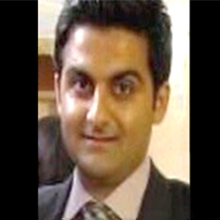 Navid Gougol
Navid GougolDepartment of Electrical & Computer Engineering
Navid’s research is in circuits/control for the brain. He has developed a novel ultrasound Phased Array (Beamformer) for medical and non-medical applications which is an order of magnitude lower cost with some performance breakthroughs. The device has applications in the brain, without opening the skull. Navid was a chip designer at AMD and Sun Microsystems, part of High Speed Ios and microprocessor design teams. He contributed to over half a dozen tape outs, where each CPU brought a billion-dollar revenue. Navid has started Yektasonics to commercialize his ultrasound research.
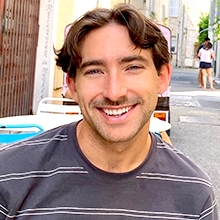 Ryan Green
Ryan GreenDepartment of Earth & Planetary Sciences
Ryan is a dedicated researcher who is passionate about tackling the challenges of climate change. Currently a 4th year PhD candidate, Ryan’s research uses biogeochemical modeling to advance our understanding of ocean alkalinity enhancement (OAE) as a marine carbon dioxide removal method. His work specifically focuses on investigating the impact, efficiency, and detection of OAE through the examination of geologic analogs and the simulation of future OAE deployment along the west coast of the United States. He is also dedicated to mentorship and teaching, evidenced by receiving multiple Teaching Assistant awards and actively mentoring undergraduate and high school students. Outside of his research, Ryan enjoys exercise, music, and food.
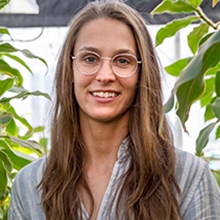 Julia Harenčár
Julia HarenčárDepartment of Ecology & Evolutionary Biology
Julia’s focus is on combining plant ecology and genetics to answer important evolutionary questions. Her multi-disciplinary dissertation will generate insight into how the environment and genome interact to shape and maintain species boundaries in recently diverged and hybridizing tropical plants. Julia has published three first-author and two co-authored articles in peer-reviewed journals. She has presented her work at international conferences and recently won best student presentation at the American Society of Naturalists conference. Julia has served as a graduate student representative to faculty both during her masters and PhD studies, where she has been an advocate for issues with outsized impacts on students from underrepresented backgrounds. She is also an active undergraduate and peer mentor informally and through formal programs. Outside of academia, Julia loves surfing, snowboarding, and exploring the California flora through hiking and backpacking.
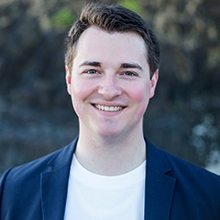 Zach Horton
Zach HortonDepartment of Statistics
Zach’s research focuses on applying Bayesian nonparametric methods to renewal process modeling, including non-homogeneous extensions such as dependence on time or covariates. Currently he is working on a Markov renewal model for predicting earthquake recurrences while accounting for previous earthquake magnitudes. His work experience includes an actuarial consulting internship, several years of teaching assistantships, and a part-time research position at an investment firm. Zach also enjoys exploring hi-fi audio and spending time with his wife and two daughters.
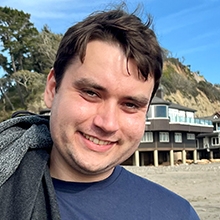 Alex Kramer
Alex KramerDepartment of Biomolecular Engineering
The COVID-19 pandemic has produced a vast genomic dataset that stressed or exceeded the capacities of most bioinformatics platforms, and similar datasets will soon be available for all major human pathogens. Alex is developing scalable tools to enable precise data exploration and accurate analysis of millions of pathogen genomes, with a broader goal of assisting readiness and response to current and future health crises. He has already contributed to six ongoing or completed publications. In Alex’s most ambitious project, he developed a way to use evolutionary compression of over 14 million SARS-CoV-2 samples to display the full genome sequence of each in a uniquely powerful and scalable "Treenome Browser" (Bioinformatics, 2023). His work will surely have a significant impact in the field of public health.
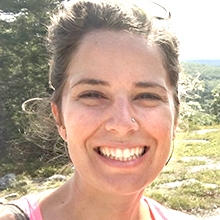 Suzanne Lipton
Suzanne LiptonDepartment of Environmental Studies
Suzanne studies agroecology; specifically, how farmer management practices can influence biodiversity and ecosystem function. She holds a Master's in Environmental Science and Policy from Columbia University and a BA from the University of Michigan. Her post-college, pre-graduate school experience working as a pastry chef at farm-to-table restaurants led to her research interests in sustainable agriculture and agrifood systems. Before pursuing her PhD, she worked for several non-profits and research centers focused on food and agriculture. She is co-author of the book Sustainable Food Production: A Primer for the 21st Century (2021).
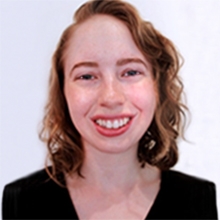 Madeline Reinsel
Madeline ReinselScience Communication Master’s Program
Originally from the Washington, D.C. area, Madeline worked as a research assistant at the College of William & Mary for several years, focused on the conservation of the diamondback terrapin, a small estuarine turtle found along the East and Gulf coasts. Her involvement inspired her interest in science communication, and a short film she created on diamondback terrapin conservation won an award in the 2023 Virginia Environmental Film Contest.
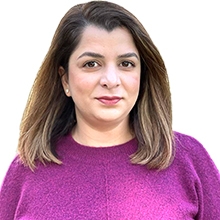 Mays Mohammed Salih
Mays Mohammed SalihDepartment of Molecular, Cell & Developmental Biology
Prior to enrolling in the graduate program, Mays developed a variety of bench, communication and leadership skills through research and professional positions. Her current educational track allows her to develop and grow her skills as an immunologist with a focus on immune response regulation. Studying mechanisms of immune regulation will help better understand how organisms respond to pathogens and mechanisms by which inflammatory and autoimmune diseases arise and ways to target them via therapeutics. Mays also leads and participates in many student outreach activities to promote diversity in STEM and support fellow graduate students.
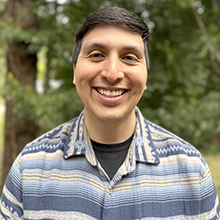 Dominic Sanchez
Dominic SanchezDepartment of Astronomy & Astrophysics
Dominic develops novel astronomical instrumentation for exoplanet science. Currently in his fourth-year in the doctoral program, he is developing improved wavefront sensing devices for atmospheric turbulence correction. The device promises to enhance our ability to study planets around nearby stars. Dominic likes to work at the interface between optical techniques and astronomical research. When not in the lab you may find him hanging out with his big friendly dog, Uli.
-
